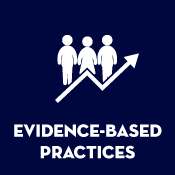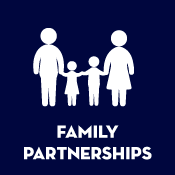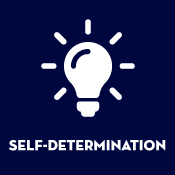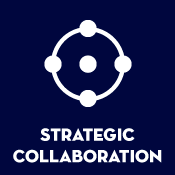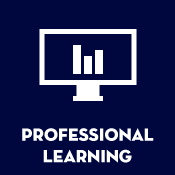
What is the Secondary Transition Resource Hub?
In partnership with our collaborators in secondary transition for the District of Columbia, the Office of the State Superintendent of Education (OSSE) has established a resource hub built upon five key strategies to support students with disabilities at every stage. These five key strategies are Evidence-Based Practices, Family Partnerships, Professional Learning, Self-Determination and Strategic Collaboration. The icons at the bottom of this page will link users to each strategy and related resources.
Who are we?
The Secondary Transition Resource Hub was developed in partnership with:
- OSSE’s Divisions of Postsecondary & Career Education (PCE), K-12 Systems & Supports (K12) and Teaching & Learning (TAL)
- SchoolTalk, Inc
What is secondary transition?
Transitions are a normal part of everyone’s life. Students transition between classrooms, grade levels and schools. Students with disabilities may also experience transitions from early intervention services to special education services. The process related to the transition to life beyond high school for students with disabilities is called secondary transition. Secondary transition is a coordinated process that supports students’ transition from K-12 schools to the three domains of postsecondary life: Postsecondary Education and Training, Employment and Independent Living (IDEA 34 C.F.R. § 300.320(b)). These domains involve a wide range of skill sets for youth with disabilities that support their adult life's trajectory.
Is secondary transition required?
The Individuals with Disabilities Education Act (IDEA) requires local education agencies (LEAs) to ensure students with disabilities have access to secondary transition supports and services through a postsecondary transition plan included in their individualized education program (IEP) (IDEA 34 C.F.R. § 300.320(b)). District of Columbia Special Education regulations outline the legal requirements for postsecondary transition plans in the District. Visit the Special Education for Students with Disabilities page for additional information about non-secondary transition specific requirements.
As an educator, how should I get started?
Review key resources to become familiar with the requirements and best practices related to secondary transition. Explore the rest of our site for more resources and best practices.
- A Transition Guide to Postsecondary Education and Employment for Students and Youth with Disabilities (2020) - US Department of Education, Office of Special Education and Rehabilitative Services (OSERS)
- District of Columbia Special Education regulations (2022)
- Secondary Transition Assessment Toolkit (2023) - OSSE
- Secondary Transition Community of Practice - facilitated in partnership with SchoolTalk, Inc.
- Secondary Transition Compliance Tool (2014) - OSSE
- Secondary Transition Policy (2011) - OSSE
- Secondary Transition Process Toolkit (2023) - OSSE
- OSSE Secondary Transition Compliance Worksheet
As a student or family member, where can I get more information or support?
Work with your school’s special education coordinator or case manager to ensure the transition plans reflect the student's strengths, preferences, interests and needs. Use the Secondary Transition Resource Hub to learn more about the secondary transition process and to access resources to support the student’s transition to postsecondary life.
- Special Education Hub – District of Columbia Office of the Ombudsman for Public Education
- Overview of the Secondary Transition Process video (2017) – The PACER Center
- Middle and High School Secondary Transition Planning – The PACER Center
Disclaimer: This resource hub is intended to help educators better understand the legal requirements of and apply best practices for secondary transition. It is not meant to give legal advice, supersede any local and/or federal law, or endorse any views, products, or services offered by sites linked in this resource hub. OSSE does not control or guarantee the accuracy, relevance, timeliness, or completeness of any linked sites and resources.



